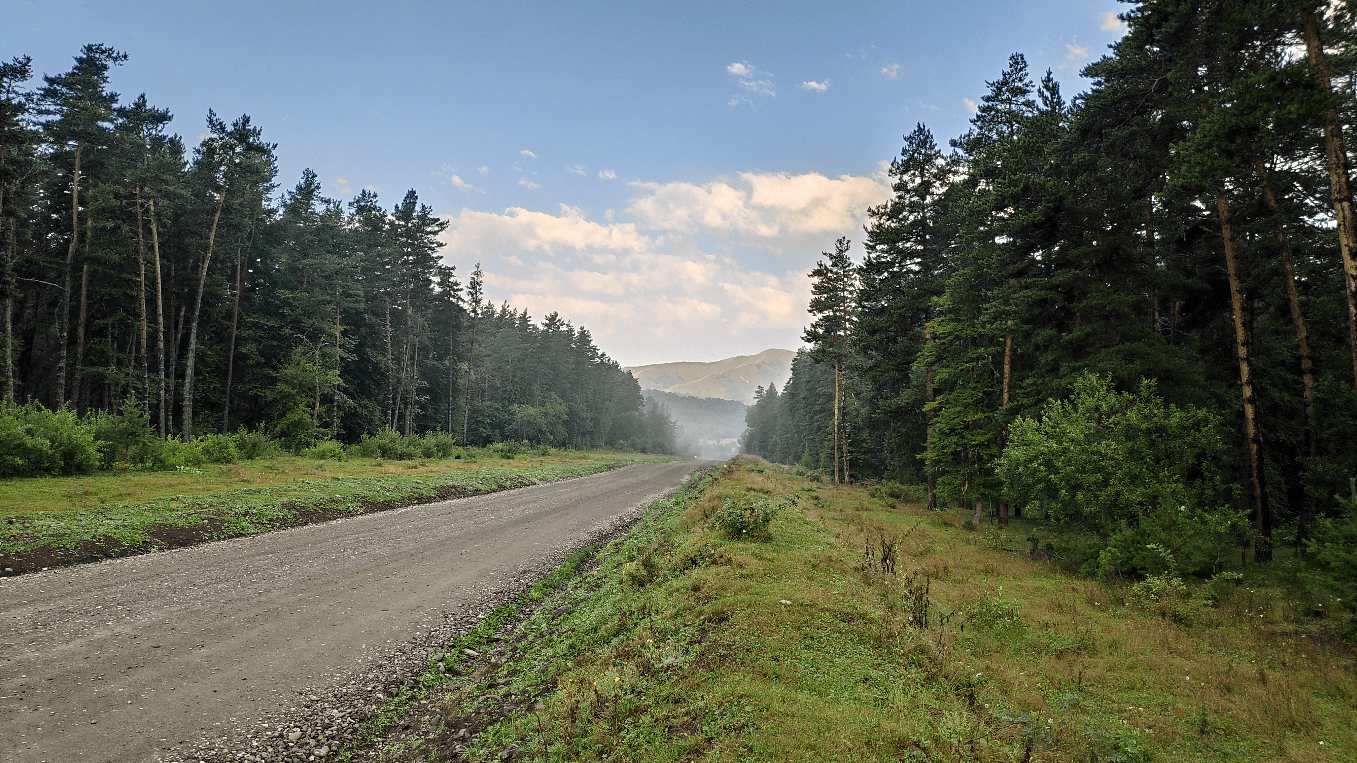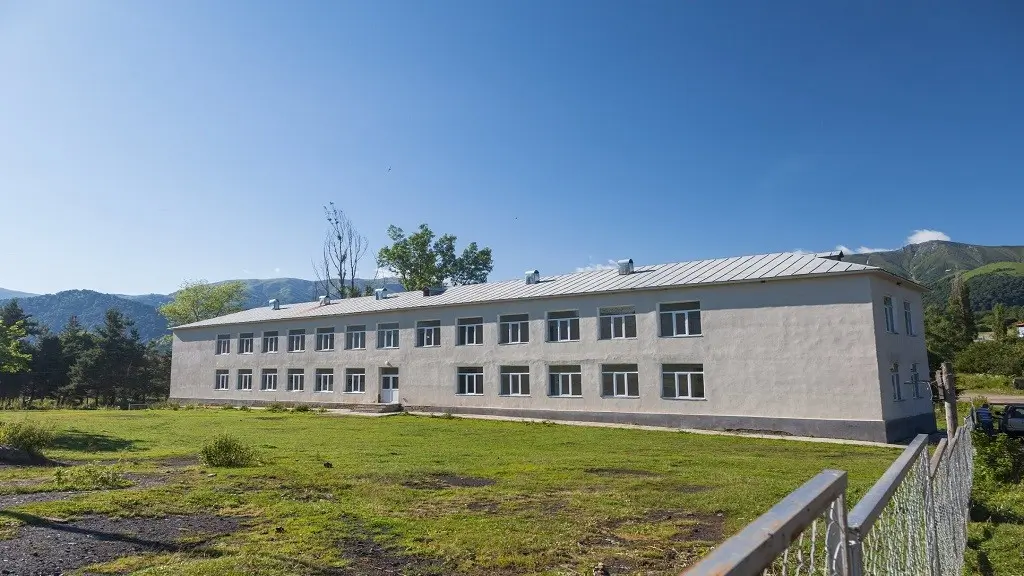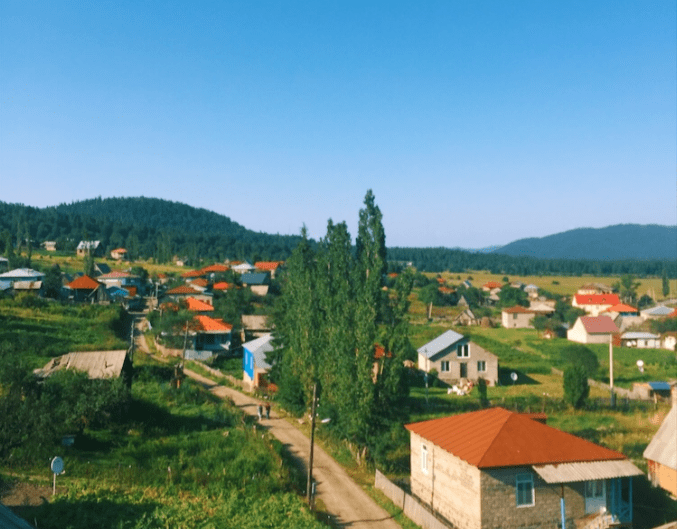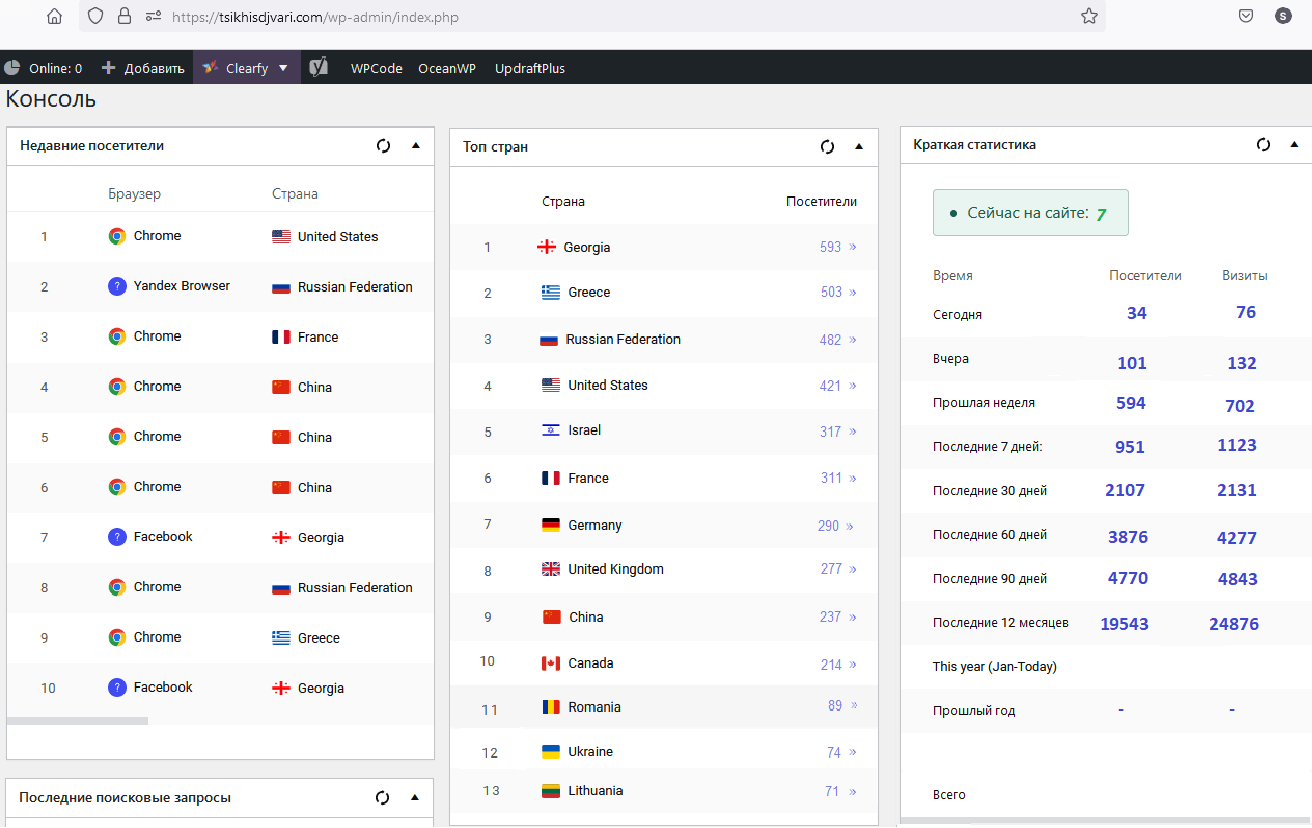Friends on the Internet found one article by a girl whose 15 years, whose grandmother is from the village of Tsikhisjvari. The young heroine of the article has never been to the village, but based on the stories of my mother and grandmother, I wrote a whole article about love and nostalgia, about the desire to visit the mother’s childhood home, which her mother remembers with affection. This article was probably written in 2018 year. Maybe someone will understand who we are talking about and whether there are related roots, read everything yourself and you will understand. We have not added or removed anything from the article., this is the original article. Enjoy reading...
Tatiana Kostyuchenkova
15 years
My Greek roots
My name is Tatyana. To me 15 years. I live in the city of Brest, I was born and raised in it. The city of Brest is the regional center of Belarus. My family consists of four people: Volodya's dad, mother Margarita and brother Andrey. My grandmother Lyudmila lives here in Brest., who came to Brest from Georgia. My brother and I love our granny very much, who is my mother's mother. My dad is from the village of Zharki, which is located in Russia. Dad is Russian by nationality, but my mother is Greek by nationality. She grew up in the Georgian capital Tbilisi. Many Greeks live in Tbilisi. There are several Greek settlements in the suburbs of the city.
In the former Soviet Union, the largest Greek settlements were in Georgia, Kazakhstan and Russia (on the Black Sea coast). My grandfather Andrey (mom's dad) was from the village of Tsikhisjvari - a purely Greek settlement in the mountains of Georgia, close to the border with Turkey. When my mom was in school, in her class from 22 students 8 was of Greek nationality, etc. is. almost a third of the class. They were all friends with each other.
The Greeks are considered throughout the world to be a rather good-natured and friendly nation.. Despite their hot temper, in modern history they have never been the instigators of international conflicts. Everyone knows their hospitality. Greek settlements are scattered throughout Georgia - this is Tsalka near Tbilisi, Akhalkalaki and Tsikhisjvari near the city of Borjomi and others. My grandmother told me, that Greeks live in these settlements, who speak not only Greek and have different religions. There are Greek settlements, where they profess the Orthodox faith and speak Greek. There are Greek settlements, where they practice the Muslim faith, but they speak Greek. There are settlements that speak Turkish, but professing Orthodoxy. Are there such settlements?, who speak Turkish and preach Islam, although they consider themselves Greeks. It all depends, whether this area was under the Turks in the distant past or not. Tsikhisdjvari - this is a settlement, which was inhabited by Greeks, whose ancestors asked for citizenship from the Russian Tsar during the Russian-Turkish War. They were hiding from the Turks, therefore, the Orthodox faith and their native Greek language were preserved.
During my school years, my mother spent all her holidays in the village with my grandparents. When mom was 8 years old grandfather died and grandmother remained in the village to live alone until old age. My grandmother had two houses nearby and a large farm. (cows, pigs, ducks, chickens and vegetable garden). Sometimes my brother and I manage to get our mother to talk about her childhood., about how she spent her holidays in the village. The problem with modern mothers, that they are always busy, Can you imagine my mother is a doctor – there’s no rest day or night, because people always get sick.
Mom remembers the time spent in the village with affection. There's a completely different way of life there, than in the city. The village people are hard-working - they work all day on the state farm and in the fields. Village children are also accustomed to work from infancy. My grandmother even taught my mother how to milk a cow.. But the grandmother felt sorry for her grandchildren and the children frolicked more, what did you do. My grandfather Andrei came from a large family. Of the eight children, four are sisters and four brothers. Mom remembers, that almost all families in the village have many children. Most families were friends with each other. All my grandfather's brothers and sisters had children - my mother's cousins, who were also sent on vacation to the village to visit their grandparents and then a cheerful company of 7-8 teenagers. You could expect anything from the mischievous kids: then they will climb into the hayloft and break the ladder along with the roof, then dancing in 12 o'clock in the morning will be arranged, when all the neighbors are sleeping, then the chickens will be scattered. Children by children, but when the adults came it was even more fun, Of course they weren't doing any mischief, but hochmili of souls. Imagine, got together 8 children and 19 grandchildren. Grandfather's eldest sister Maria had three sons, Elizabeth's second sister had two sons, the third sister Olympia had one son, the fourth sister Elena had four daughters. The elder brother Dmitry had two sons and one daughter, second brother Ivan had two daughters and one son, the third brother Vasily had two children, son and daughter, and grandpa only had my mom. Some of my grandfather's brothers and sisters had their own houses in the village, but nevertheless, everyone loved to gather with my great-grandmother, especially in the evenings. Mom remembers, that her father's family was friendly, cheerful and melodious. Everyone except my grandfather sang, especially my mother's Uncle Vasya. But my grandfather was famous for making up jokes and gags. Adults communicated with each other only in Greek and sang Greek songs. The children studied in Russian schools, therefore not everyone knew Greek. There were no Greek schools then. When mom grew up and came to the village, then I found out, that in the village school, along with a foreign language, compulsory study of the Greek language was introduced and this is correct, after all, in fact, the native language of the villagers is Greek, not Russian with Georgian. Everyone already knew them.
When, after another meeting with relatives, the adults left, the children stayed in the village to finish their holidays. In good weather, my mother and her cousins went to the forest to pick berries.: strawberries, wild raspberries and currants (they were considered more useful, than those grown in gardens and orchards). We had to go very far into the forest, and even climb high up the mountain, there were berries growing in the ravines. On the way, the kids were playing and laughing, of course., so the path did not seem difficult. The whole crowd returned in the evening, tired and happy. Mom's older brothers were guides. Mom remembers them fondly, since she was the youngest, everyone loved and spoiled her. On some sunny days, the children went to local meadows to collect herbs, and also in the forest to collect hazelnuts, rose hip, wild panda pear. Before leaving the house, the grandmother showed and explained what grass the children should bring her.. In the evening everything was strictly sorted, tied into bundles and sent to the attic to dry. Then all this was used for tea (thyme, chamomile, Melisa, mint, sweetheart, rose hip) and for preparing medicinal infusions (immortelle, burdock and others). Dried wild panda pear was used to treat indigestion. My mother’s grandmother also knew how to remove the evil eye with prayers. Mom still regrets, that she didn’t learn traditional healing from her grandmother. When my mother was in her 3rd year of medical university, her grandmother passed away.
Each berry and herb has its own harvest time, when they bring maximum benefit and grandma knew it. In general, Tsikhisjvari is located high in the mountains in a very picturesque place. There are no settlements above this village. Houses are built in a small valley in a row. New buildings are located almost in the forest. There are high mountains around. Even in the hot summer, the tops of the mountains are covered with snow. In winter there is a lot of snow and temperatures down to -30ºС, in summer it is warm up to +30ºС, but the nights are cool. Even though the mountains are old, they sometimes shake. Mom remembers, that one evening, when the whole family was drinking tea, the mugs suddenly began to shake and move - it was an earthquake. Earthquakes are frequent there, but not strong - 2-3 points, that's why no one is afraid of them. A mountain river flows through the village - it is fast-flowing, but not wide, meters 10 and one and a half meters deep. But despite such shallow waters, it never dries out even in hot summers. There are also streams in the mountains. All the mountains are in the forests. The forests around are mixed, coniferous and deciduous, but there are much more coniferous trees. The pines and spruce trees there are centuries old. Since the village is located far from cities and other settlements, there is no production there. Gorgeous forests around, so the air there is amazingly clean. Forests are rich in berries, mushrooms, and mountain rivers are filled with trout.
For mom and other children, mushroom picking and fishing were like a special ritual. The guys went there with Uncle Vasya, who lived next door to his grandmother. Uncle Vasya was the only great-grandmother's child, who never left the village. In the evenings he came in and announced, that he is going fishing tomorrow and everyone can join him. Everyone was willing, except grandma. The preparations began immediately after dinner. The boys were preparing fishing nets, sticks, buckets, bread (fish bait) and special rubber boots. Parents took care, so there were boots from small to large. The girls collected food and drink. Before dawn, the “uh” brigade was leaving on motorcycles away from residential buildings upstream of the river. There, Uncle Vasya and the boys set up nets near the boulders and threw bread into them. After some time, Uncle Vasya shook and moved the stones under which the mountain trout usually hid, and the guys caught it with nets and nets. This is not an easy procedure, requiring attention and skill, because the fish is evasive. Mountain trout is not a large fish with multi-colored iridescent scales. Mom was always surprised, why do they catch fish with nets?, not with a fishing rod, to which my uncle replied: “Trout is not the same fish, which you catch with a fishing rod". The fish were brought home alive in buckets, then my grandmother and uncle’s wife cleaned it and fried it on the grill. When, many years later, my mother came to Greece, then I noticed, that they also try to fry the fish on the grill. And my mother also noticed, that in Greece they eat a lot of olives and salads are dressed mainly with olive oil. In the village they ate the same, although oilseed trees did not grow in gardens due to the cold climate. Large jars of olives and olive oil stood in everyone’s basements and pantries.. They were brought from afar by order. These taste preferences were passed down from our ancestors..
Mushroom picking was also a favorite activity of the children.. We went for mushrooms in rainy and cloudy weather. In the evening at dinner it was announced, that everyone who wants to go mushroom picking must get up at six o’clock tomorrow and stand with buckets at the gate. The adults had no intention of waking up the children.. The next morning, Uncle Vasya quietly left the house, trying not to wake anyone up and go unnoticed. In his heart he probably hoped, that the kids are sleeping, after all, they usually got up at 9-10 o'clock in the morning, but that was not the case - the whole cheerful bunch with buckets was hiding behind the gate in the bushes and quietly giggling. As my uncle approached, the laughter intensified.. Uncle was coming, smiled and spoke: "Forward!». There were always a lot of mushrooms, although the whole village collected them. Didn't have to go far from home. Various mushrooms grew in the forest, but there were especially a lot of russula, again, oiled and white. But everyone gave particular preference to the mushroom, which was called Greek, he grew up only in that area. No one could explain why the mushroom was called Greek, since it was not in the books about mushrooms. Greek mushroom was considered the most delicious, even tastier than white ones. It was cooked, fried baked on coals and grill, but never salted or dried. Mom tried many times to find the Greek mushroom in pictures and descriptions, but I never found it. Maybe, he's really Greek, since it doesn’t grow anywhere else and no one else knows it. All other mushrooms were dried, salted in barrels, and also pickled in jars.
Mom also liked to help grandma, when she baked Greek bread and cooked macarines (a flour product similar to modern noodles). A whole day was allotted for baking bread.. We baked bread with one of our relatives, there was a large oven for baking loaves and a special well for baking Greek flatbreads. Several women gathered to work. In large wooden troughs, dough was kneaded for loaves and separately for Greek lavash. While the bread dough is rising, Macarine dough is kneaded on huge wooden tables. After kneading, the dough is rolled out thin and into pancakes., which are subsequently cut into thin strips, which is placed on special blades and dried in the oven. After drying, the macarines are ready to cook. Boil them in water or broth.
For 3-4 within an hour, housewives have time to prepare several bags of macarines in reserve. After several hours of hard work, a short break is made. Everyone sits down together to drink everyone’s favorite drink - black natural coffee.. Everyone loves and drinks coffee. There was a tradition in the village: the arriving guest was served a cup of freshly brewed coffee. Coffee is drunk slowly, savoring the taste. While the guest is enjoying coffee, look, the hostess has already put food on the table, so our women drank coffee, rested and began to continue working - baking bread. First, pita bread is baked on the walls of a special well., then the loaves in the oven. The first loaves are baked small, to feed them to children. Taking the bread out of the oven, cut into pieces, spread these pieces with homemade butter, and cheese will be sliced on top. Hot bread, the butter is melting, cheese melts - delicious, don't tear yourself away, the aroma of bread throughout the area. Country cheese is a whole work of art. Several varieties of cheese are brewed, but most of all the so-called long cheese. It's boiled, squeeze out, and then pulled out like a rope, then it is wound on a thick wooden stick and hung for several hours to dry. When the cheese dries, it is torn into pieces and placed with salt in clay jugs for storage. Mom thinks, that this is the most delicious cheese, which she has ever eaten.
Let's return to our women, bread bakers. Bread baking ends quite late. Women with bread are transported home on carts. Lavash will be eaten in the first two days, but the loaves in a special container will be stored for a week. Homemade bread will dry out a little, but it won't get moldy. What modern bread will age for so long?? No. Bread was delivered to village stores, but it was very different from home. The people in the village are hard-working, works all day, but he also knew how to rest. Sometimes on Saturdays villagers gathered for the so-called “funeral”. In the very center of the village there was a church with a bell tower. The village boys were ringing the bells and shouting: "Evil, evil!». This meant, that those who want to have fun can gather in the central square. A large fire was lit in the square, around which everyone gathered. The older generation usually sat on benches, the youth stood. The singing began. Everyone sings melodic and playful songs in Greek. As is known all over the world, Greeks have good hearing. A nation that sings and dances. One starts a song, others pick up. After the singing, dancing begins around the fire.. Dancing, certainly, sertaki - everyone’s favorite national dance. The party lasts until dawn. In the morning many went to church. The Greeks are a God-worshipping people. Children were baptized and Orthodox holidays were always celebrated. The village church was directly opposite my great-grandmother's house. My great-grandmother Margarita kept order in the church, cleaned it up, she also made wax candles. My mother and other guys helped my grandmother make candles. As my grandmother Lyudmila tells it, my mother is restless, but surprisingly patiently she could make candles for hours. The great-grandmother strictly monitored the quality of the candles. Candles were made in different sizes and different candles were lit on different religious holidays. The cultural and religious practices of the Greeks go back centuries.. Major church holidays were celebrated on a special scale. When mom was little, she remembers, that in the village every weekend the priest held services in the church. Then the priest died and priests rarely came from other parishes to conduct services.. We went to the nearest city of Borjomi to baptize children and marry newlyweds, which was located two hours' drive from the village. My mother was also baptized in Borjomi. And my mother also remembers, that she really enjoyed being in the village on St. Mary's Day, which is celebrated according to the church calendar 28 august. In the village this holiday was called “Marioba”. A couple of days before the holiday, almost the whole family gathered. The day before they bought rams for sacrifice. On the day of “Marioba” from the very morning, since seven o'clock, everyone was on their way. It was necessary to go far and high up the mountain. There in the clearing, near the river stood an old dilapidated church, which consisted of three walls and a canopy. It was visible on the walls, that they are centuries old, but the canopy was clearly made recently. Barely visible images of saints were painted on the walls. There are traces of many lit candles around. My great-grandmother was the first to enter the church. She lit a lamp there and placed the largest candles, then everyone followed her example, then the great-grandmother read a prayer and the adults along with her. The kids lit candles and stood quietly nearby. After prayer, the men dragged sheep to the church, they were led around the church three times and cut to the side. The sheep were skinned - the unnecessary stuff was buried, and the meat was cut and boiled in a large vat. Ready meat eaten, and the leftovers were distributed to others. Everything must be eaten without a trace. In addition to my mother’s family, there were many other village families near the church in the clearing.. Each family spent the first meal in isolation, and then all the families united into one big family. It all ended with singing. In my grandfather’s family, the main singer was my mother’s Uncle Vasily. If my grandfather was a joker and a master of practical jokes, then Uncle Vasya was a singer. He sang always and everywhere. I sang when I was working, sang when I went mushroom picking with the kids, sang at all holidays and weddings. Uncle Vasya was the favorite of the whole family and the village. Everyone returned home at dusk. Two days after the holiday everyone went home. Most of the children were schoolchildren, and they started a new school year. Summer holidays were over, and with them a cheerful, carefree life in the village.
During the winter holidays, they also brought my mother to my grandmother’s house., and with her other children. There is a lot of snow in the village in winter, In some places the snow cover reached one and a half meters in height. The kids were given the task of clearing the paths, otherwise it was impossible to go out into the yard because of the huge snowdrifts. After cleaning the area, the guys went skiing and sledding. And in the evening, a flushed crowd of urchins flew into the house. Drank rosehip tea, ate potatoes, baked in skin with cheese and meat, then they sat down to play cards. The loser was marked on the forehead and cheeks with a spool of thread., previously lowered into ash. Imagine, how handsome everyone was sitting with their polka dot faces. Even my mother's grandmother played cards with the children. Of course it wasn’t “stamped” with ash, but she never lost. Marvelous, but now mom never plays cards anywhere, speaks, that this is children's holiday fun.
Sometimes relatives from Greece came to visit one of the villagers. This visit was a significant event. In those distant times, it was almost impossible to travel abroad, and it was also problematic to come to relatives in the village. If one of the villagers managed to go to visit relatives in Greece, this person was almost a national hero. He was invited from one house to another, so that he can tell how people live in Greece. Then times changed, the so-called “iron curtain” collapsed and many young people left the village for permanent residence in Greece. A lot of my mother’s relatives also left. When troubled times came in Georgia, even more of my mother’s relatives began to leave: who's going to Greece, who's going to Russia. My mother had graduated from school by that time and left to study. When my mother studied at the University of Tartu, I met my dad and they got married. After graduating from university, dad brought mom to Brest, they stayed here to live. Me and my brother were born here. Over the years, contact with some of my mother’s relatives has been lost, something my mom really regrets. We call back with our relatives who remain in Georgia.
My dad says, what when will it be calm in Georgia?, We will definitely go to Tsikhisjvari with the whole family, so that my brother and I can see our mother’s childhood home. My brother and I love our mother very much and are proud of, that we have Greek roots and a piece of Greek blood flows in us. Is it true, I don't look like my mom at all.
When at school in history or geography they give the task to prepare information about any country in the world, I always take Greece, and as a rule, the report is always the best. I've already won more than one competition. Maybe, this is the call of the ancestors. I dream of visiting Greece, in the historical homeland of my mother. Hope, this dream will come true someday. I love the country in which I was born and raised, but I'm sure, that Greece is also a beautiful country!
PS: Original source - https://pandia.ru/text/77/28/96181.php











